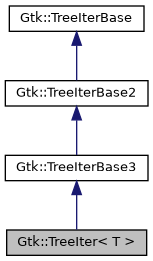gtkmm: Gtk::TreeIter< T > Class Template Reference
Typedefed as TreeModel::iterator and TreeModel::const_iterator. More...
#include <gtkmm/treeiter.h>

Public Types | |
| using | iterator_category = std::bidirectional_iterator_tag |
| using | value_type = T |
| using | difference_type = int |
| using | reference = T& |
| using | pointer = T* |
Public Member Functions | |
| TreeIter () | |
| template<typename T2 , typename = typename std::enable_if< std::is_same<T, TreeConstRow>::value && std::is_same<T2, TreeRow>::value, T2>::type> | |
| TreeIter (const TreeIter< T2 >& src) | |
| iterator to const_iterator conversion. More... | |
| template<typename T2 , typename = typename std::enable_if< std::is_same<T, TreeConstRow>::value && std::is_same<T2, TreeRow>::value, T2>::type> | |
| TreeIter& | operator= (const TreeIter< T2 >& src) |
| iterator to const_iterator assignment. More... | |
| TreeIter& | operator++ () |
| TreeIter | operator++ (int) |
| TreeIter& | operator-- () |
| Note that this is very slow compared to operator++(). More... | |
| TreeIter | operator-- (int) |
| Note that this is very slow compared to operator++(int). More... | |
| reference | operator* () const |
| pointer | operator-> () const |
| operator bool () const | |
| Discover whether the iterator is valid, and not equal to end(). More... | |
 Public Member Functions inherited from Gtk::TreeIterBase3 Public Member Functions inherited from Gtk::TreeIterBase3 | |
| bool | equal (const TreeIterBase3& other) const |
| int | get_stamp () const |
| This is only useful when implementing a custom Gtk::TreeModel class. More... | |
| void | set_stamp (int stamp) |
| This is only useful when implementing a custom Gtk::TreeModel class. More... | |
 Public Member Functions inherited from Gtk::TreeIterBase Public Member Functions inherited from Gtk::TreeIterBase | |
| TreeIterBase (const TreeIterBase& other) noexcept | |
| TreeIterBase& | operator= (const TreeIterBase& other) noexcept |
| TreeIterBase (TreeIterBase&& other) noexcept | |
| TreeIterBase& | operator= (TreeIterBase&& other) noexcept |
| TreeIterBase () | |
| TreeIterBase (const GtkTreeIter* gobject) | |
| GtkTreeIter* | gobj () |
| Provides access to the underlying C instance. More... | |
| const GtkTreeIter* | gobj () const |
| Provides access to the underlying C instance. More... | |
Related Functions | |
(Note that these are not member functions.) | |
| bool | operator== (const TreeIterBase3& lhs, const TreeIterBase3& rhs) |
| bool | operator!= (const TreeIterBase3& lhs, const TreeIterBase3& rhs) |
Additional Inherited Members | |
 Static Public Member Functions inherited from Gtk::TreeIterBase Static Public Member Functions inherited from Gtk::TreeIterBase | |
| static GType | get_type () |
| Get the GType for this class, for use with the underlying GObject type system. More... | |
 Protected Attributes inherited from Gtk::TreeIterBase Protected Attributes inherited from Gtk::TreeIterBase | |
| GtkTreeIter | gobject_ |
Detailed Description
template<typename T>
class Gtk::TreeIter< T >
Typedefed as TreeModel::iterator and TreeModel::const_iterator.
A Gtk::TreeModel::iterator is a reference to a specific node on a specific model. It is a generic structure with an integer and three generic pointers. These are filled in by the model in a model-specific way.
One can convert a path to an iterator by calling Gtk::TreeModel::get_iter().
These iterators are the primary way of accessing a model and are similar to the iterators used by Gtk::TextBuffer. The model interface defines a set of operations using them for navigating the model.
The lifecycle of an iterator can be a little confusing at first. Iterators are expected to always be valid for as long as the model is unchanged (and doesn't emit a signal). Additionally, some models guarantee that an iterator is valid for as long as the node it refers to is valid (most notably the Gtk::TreeStore and Gtk::ListStore).
Although generally uninteresting, as one always has to allow for the case where iterators do not persist beyond a signal, some very important performance enhancements were made in the sort model. As a result, the Gtk::TreeModel::Flags::ITERS_PERSIST flag was added to indicate this behaviour - see Gtk::TreeModel::get_flags().
- Template Parameters
-
T TreeRow for an iterator, TreeConstRow for a const_iterator.
Member Typedef Documentation
| using Gtk::TreeIter< T >::difference_type = int |
| using Gtk::TreeIter< T >::iterator_category = std::bidirectional_iterator_tag |
| using Gtk::TreeIter< T >::pointer = T* |
| using Gtk::TreeIter< T >::reference = T& |
| using Gtk::TreeIter< T >::value_type = T |
Constructor & Destructor Documentation
| Gtk::TreeIter< T >::TreeIter | ( | ) |
| Gtk::TreeIter< T >::TreeIter | ( | const TreeIter< T2 >& | src | ) |
iterator to const_iterator conversion.
Member Function Documentation
|
inlineexplicit |
Discover whether the iterator is valid, and not equal to end().
For instance,
|
inline |
| TreeIter& Gtk::TreeIter< T >::operator++ | ( | ) |
| TreeIter Gtk::TreeIter< T >::operator++ | ( | int | ) |
| TreeIter& Gtk::TreeIter< T >::operator-- | ( | ) |
Note that this is very slow compared to operator++().
| TreeIter Gtk::TreeIter< T >::operator-- | ( | int | ) |
Note that this is very slow compared to operator++(int).
|
inline |
| TreeIter& Gtk::TreeIter< T >::operator= | ( | const TreeIter< T2 >& | src | ) |
iterator to const_iterator assignment.
Friends And Related Function Documentation
|
related |
|
related |
